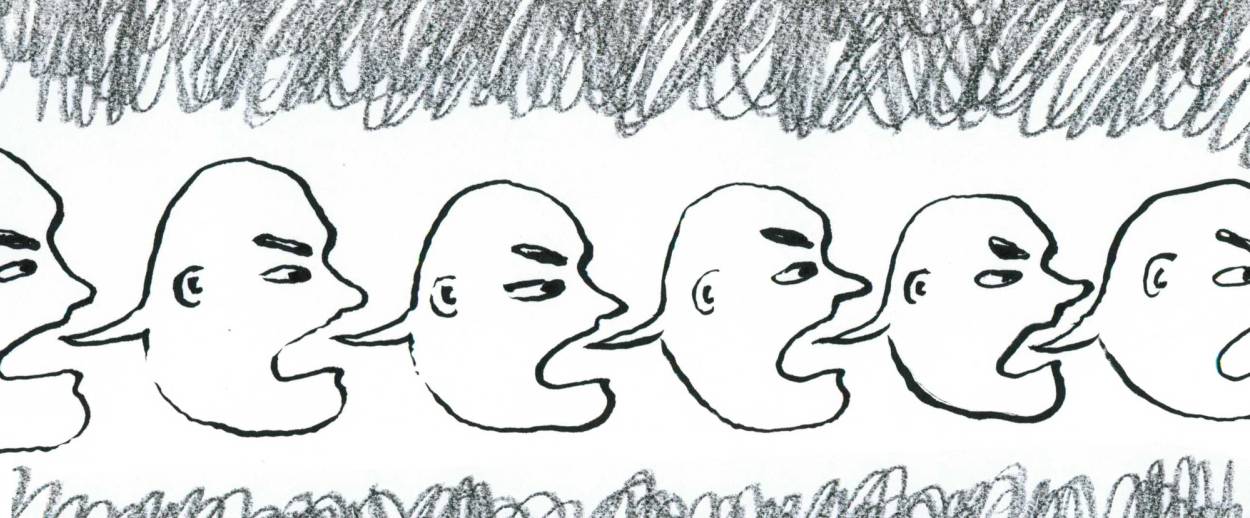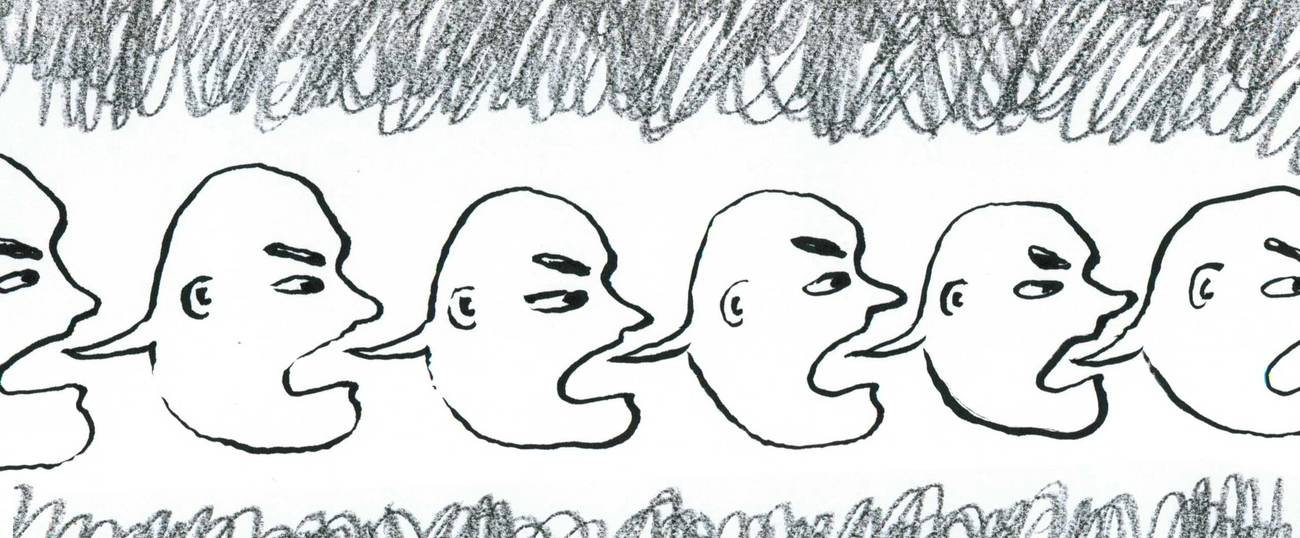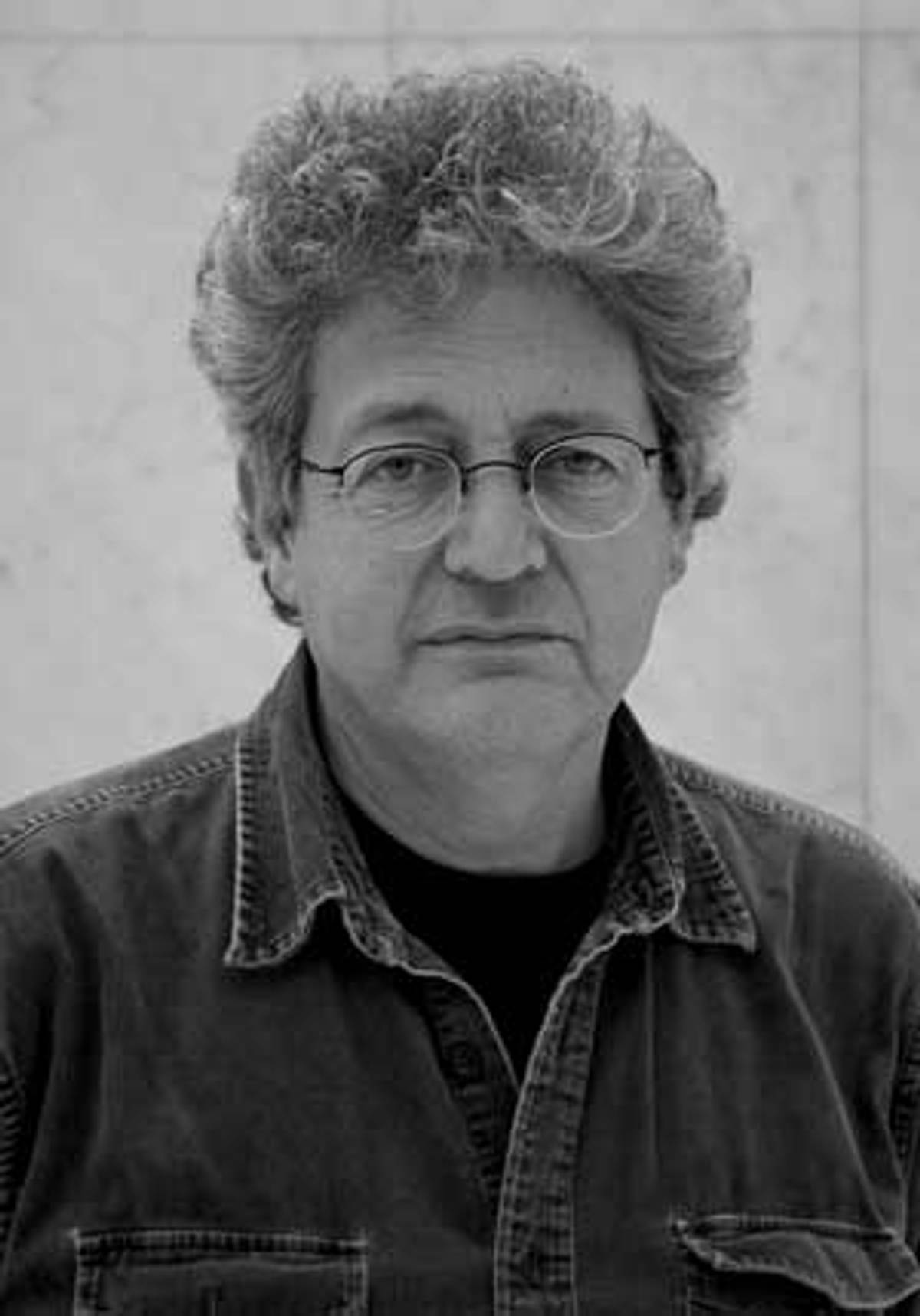Is the Shoah Memorial in Paris Home to a Racist?
The troubling case of Holocaust historian Georges Bensoussan, on trial for ‘incitement to racial hatred,’ pits French anti-racists against anti-anti-Semites




This is a story about permissible and impermissible ways to use words in post-terror France.
Its main protagonist, Georges Bensoussan, is a 65-year-old historian who is currently a lead editor at the Shoah Memorial in Paris, a work he performs under the intellectual auspices of Michel Foucault and Philippe Ariès and on the assumption that the genocide in Europe was the result of a collective cultural history rather than a weird anomaly. In 2006, he published Europe, Une Passion Génocidaire (Europe: A Genocidal Passion), a work he defined as “an intellectual archeology of the Shoah” and an attempt to rehabilitate “a historical approach wrongly accused of being essentialist.” He has also published several books on Israel and the history of Zionism.
In 2002, Bensoussan broke into the French media landscape under the pseudonym of Emmanuel Brenner as the author of a collective book called Les Territoires Perdus de la République (The Republic’s Lost Territories). Les Territoires was the first account directly written by teachers and high-school directors set in the French cités, testifying to the anti-Semitism, sexism, and racism that plagued these places and emanated, for the most part, from kids whose cultural roots were in North African Muslim countries. The book was both an immediate hit and a scandal, and Bensoussan soon ended up labeled by the left as a “new reactionary” and a “French neocon.” At the time—two years after the collapse of the Oslo Peace Process in Israel, and one year after Sept. 11, with the Iraq war in the wings and after Jean-Marie Le Pen’s second-place finish in the first round of the presidential election that spring—anyone disagreeing with the left-wing doxa that any mention of anti-Semitism in the cités was extreme-right-wing propaganda was sure to end up on such a list. Bearing a Jewish name did not help.

But Bensoussan’s book also found serious defenders the intellectual/media French world. In addition to the philosophers Élisabeth Badinter, Pascal Bruckner, and Alain Finkielkraut, support came from the Algerian writer Boualem Sansal, who had witnessed the Algerian civil war of the 1990s, as well as the Algerian journalist Mohamed Sifaoui, who risked his life both in Algeria and in France denouncing Islamist threats. The anti-racists of the LICRA (the League Against Racism and Anti-Semitism) also supported Bensoussan’s venture into truth-telling. With time, Les Territoires Perdus de la République became a reference for anyone looking for an accurate description of what was going on in some places in France. In 2004, two successive government reports commissioned to investigate anti-Jewish violence in the French suburbs backed Bensoussan’s conclusions, although both were shelved because their conclusions were politically inconvenient. The abduction, torture, and murder of Ilan Halimi two years later came to give the first extreme illustration of what Bensoussan had announced; in the meantime, anti-Jewish violence kept rising; after Mohamed Merah’s murder spree in Toulouse in 2012, it would reach the impressive level of two attacks a day. In short, the thrust of Bensoussan’s book had attained the status of an inconvenient though widely recognized truth.
On Oct. 10, 2015, Bensoussan was invited to Répliques, the radio talk-show hosted by the philosopher Alain Finkielkraut on France-Culture, the French NPR. A leading intellectual in France, and now a member of the Académie Française, Finkielkraut is celebrated for his unique mix of what is seen as Jewish intellectual courage and a no less Jewish irrational hot temper, a combination that has led him to disputable positions at best—such as his unflinching support for the anti-Semite and racist French writer Renaud Camus, who is today a member of the National Front. The occasion was a documentary titled Profs en Territoires Perdus de la République? set to be aired the very evening of the same day at 11 p.m. During the course of the radio show, Bensoussan said this (translation mine):
Today, we are in the presence of another people inside of the French nation, and this results in the fact that a certain number of democratic values that structured our society are now regressing. There won’t be any integration as long as we will not get rid of this atavistic anti-Semitism, which is concealed as a secret. Just let me quote an Algerian sociologist, Smaïn Laacher, who with great courage said as much in the documentary. “It is a shame,” he said, “to maintain this taboo that in Arab families in France—and everybody knows this but nobody wants to say it—anti-Semitism, it is suckled along with mother’s milk.
The next day, the “Algerian sociologist” in question, Smaïn Laacher, answered:
I never said or wrote anywhere that kind of ignominy. How could anyone believe even for a half of a second that in these families, anti-Semitism would finally be passed on by blood? My work, my positions, and my public engagements all stand for my relentless efforts against any form of essentialism, should it even be involuntary. I never assumed that a biological order could be the first rudiments of a religious, ethnic, or national hate. This purely fantastical quote must be seen as a naïve, if cowardly, attempt to enlist me on a “side” against another.
Two things especially angered Laacher in Bensoussan’s phrasing, he told me when we met a few days after his statement. One was the metamorphosis of his research and theories into a vague metaphor of dubious meaning about poisoned milk. What he actually said in the documentary, which Bensoussan had somewhat carelessly paraphrased, was this: “This anti-Semitism is already planted into the domestic space. It quasi-naturally rolls off the tongue, planted into the tongue.” He went on: “From parents to children, when they want to reprimand them, it is enough to call them Jews. OK, every Arab family knows that. Not to see that this anti-Semitism is first domestic is a monumental hypocrisy.”
Though the differences between what Laacher actually said about “rolling off the tongue” in “domestic space” and Bensoussan’s off-the-cuff summary of anti-Semitism being imbibed with “mother’s milk” may seem to be a variety of French academic hair-splitting, they are not entirely insignificant. Laacher is an anthropologist and a sociologist of the Bourdieu school, whose primary concern is the language, the tongue, and it matters a great deal that in French the same word—la langue— designates both language and the physical organ. “Language,” Laacher told me, “is the collective component through which the individual expresses himself. It speaks us as much as we speak it. And it never speaks randomly; it is always meaningful. As we are spoken by the tongue, collective values and feelings, what we call a culture, is being passed on. Of course, this includes the passing on of negative feelings and passions such as hate.”
Implicit in this line of thought is the notion that the key to escaping this codified collective tongue with its murderous potential is the ability of the individual to conquer a language of his own, a verbal subjectivity, so to speak. An idea that, needless to say, the “poisoned milk” metaphor totally obliterates. For, quite obviously, if your blood is poisoned by your mother’s milk at birth, unless you submit yourself to a massive transfusion, you’re doomed. So, although Bensoussan may not have used a direct biological argument, his phrasing clearly did not leave a lot of positive options for the poisoned Arabs.
But something else bothered Laacher almost as much. It was Bensoussan’s mention of him as an “Algerian sociologist.” “From where does he know I’m an Algerian?” he told me. “Because I look like one? Because of my name? Of Algeria, I know almost nothing. Each time I have to go there for my reaserch, I have to get a visa like any French citizen. I was born in France, I’m French, and I’m probably more French than Bensoussan will ever be.” (Bensoussan was born in Morocco.)
In the autumn of 2015, Laacher filed a complaint of libel against Bensoussan. Then, in February 2016, Laacher’s and Bensoussan’s lawyers put together an official communiqué. In it, Bensoussan, maintaining his “freedom of interpretation,” recognized that he had misquoted Laacher’s interview in good faith. The two men agreed to let the matter rest and to abstain from any further public comment on the subject.
That’s when things turned tricky. In the meantime, a Muslim institution called the CCIF had gotten wind of the story and decided to take its own legal steps. The CCIF is the Comité Contre l’Islamophobie en France (Committee Against Islamophobia in France). Although New York Times journalists are sometimes fond of it, CCIF is a militant organization that has been accused of receiving backing from Qatar and having close ties to the Muslim Brotherhood. It uses the language of anti-racism to advance its own political goals. Following the French procedure, the CCIF signaled Bensoussan’s problematic sentences to the Ministère Public (the equivalent of a district attorney, which in France is not elected but appointed by the Ministry of Justice). The ministry, in turn, decided to sue Bensoussan for “incitement to racial hatred.”
The idea that the chief editor of the Shoah Memorial was being sued by the government of France for incitement to racial hatred was certainly something. To further complicate the matter, the League Against Anti-Semitism and Racism began to consider that if the CCIF made that kind of move on such a publicized case, it could not stand by. The president of the LICRA is the lawyer Alain Jakubowicz, prosecutor of the war criminals Klaus Barbie and Paul Touvier in the name of the Consistoire Israélite de France. In fact, the entire history of the League is deeply rooted in French-Jewish history: It was established in 1926 by a Jewish journalist by the name of Bernard Lecache to legally assist the anarchist Jew Sholom Schwartzbard after he’d killed the Ukrainian and pogromist Symon Petliura in a Paris street. In the 1930s, the LICRA stood in defense of Jews who had murdered Nazi diplomats. As such, in the past 15 years, the LICRA has been under growing pressure in the banlieues of Paris, where most of its offices are located—and where it is considered by left-wingers, communists, and Muslims alike as an “oriented” organization: soft on racism but hard on anti-Semitism. Yet to sue Bensoussan was almost unthinkable.
In June 2016, a meeting was set at LICRA headquarters with Jakubowicz, the Algerian writer Boualem Sansal, and Georges Bensoussan to try and clarify the matter. Accounts of the discussions so vary that to guess what happened there is simply impossible. The one certain thing is that everybody came out of it convinced that the potential conflict was resolved. Was the decision to make a public statement taken? According to Georges Bensoussan, “Antoine Spire”—one of the LICRA leaders—“was to write it and, of course, I would have countersigned it. But I don’t recall having received anything.” Paris Director of the American Jewish Committee Simone Rodan Benzaquen remembers differently: “I offered Georges [Bensoussan] to give him a hand to write them, but he declined. It was more than simple to make things right. It was three lines to write, and that would have closed the matter once and for all. But he did not, and the consequences are catastrophic.” A few months later, Bensoussan says, he was shocked to discover that the LICRA was aligning itself with CCIF. As a result, Alain Finkielkraut, among others, resigned from the LICRA.
The Bensoussan trial opened Jan. 25. That same day Georges Bensoussan gave an interview to the Jewish newspaper Actualités Juives claiming that Laacher had withdrawn his complaint without any form of negotiation. The next day, Laacher produced their common communiqué, which, incomprehensibly, had never been made public.
It gives an idea of the tension inside the packed courtroom that the hearing lasted from 2 p.m. to past midnight. The Algerian journalist Mohamed Sifaoui testified on behalf of the LICRA to the “racist” nature of Bensoussan’s phrasing. The verdict is due March 5. If Bensoussan is not convicted, the CCIF is sure to appeal; if he is condemned, it will appear as a legal “proof” that Jews at the most prominent positions—chief editor of the Shoah Memorial—are in fact, racists, and therefore do use the Shoah to their own benefit.
Whatever the verdict is, a side once united is now deeply and probably irremediably split.
Meanwhile, a new terror network has just been dismantled in France.
***
To read more of Marc Weitzmann’s reporting for Tablet magazine on Islamism and anti-Semitism in France, click here.
Marc Weitzmann is the author of 12 books, including, most recently, Hate: The Rising Tide of Anti-Semitism in France (and What It Means for Us). He is a regular contributor to Le Monde and Le Point and hosts Signes des Temps, a weekly public radio show on France Culture.